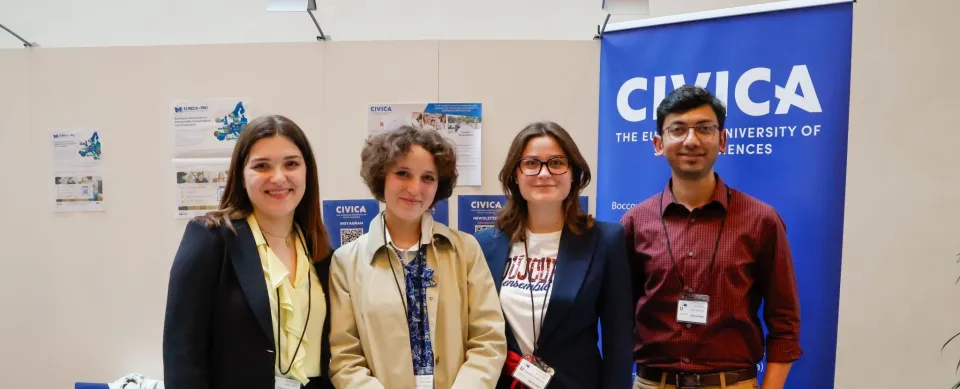
Elisabetta Takes Her Ideas for Tackling Inequalities to the European Parliament
“It was unforgettable. Being inside the European Parliament and discussing policy ideas was exciting and inspiring.” This is how Bocconi student Elisabetta Chiuminatto describes her experience at the 2025 European Student Assembly in Strasbourg at the end of May where she discussed and networked with 230 other students of the European Universities Alliances.
The participation at the European Student Assembly is one of the many extracurricular initiatives open to students of the CIVICA alliance, of which Bocconi is a founding member, with the aim to encourage cross-nation exchange and interactions. It is an annual event which gathers more than 230 students from across the European Universities Alliances (EUAs) to debate, first online and then onsite, issues that are central to students in Europe, draft policy recommendations on the future of Europe and advocate for them among stakeholders and decision-makers.
From February to May the selected students worked with other members of the same panel to deepen their understanding of their topic. Then in Strasbourg, they discussed and finalized their recommendations and also heard from other panels' discussions and debate. Finally, they voted on all policy recommendations prepared in a plenary session and then had the opportunity to participate in dissemination activities afterwards.
We talked to Elisabetta to hear about her experience:
Why did you decide to participate at ESA?
I joined the European Student Assembly partly out of curiosity, and partly because I wanted to challenge myself. I wasn’t entirely sure what to expect, but I knew it would be a chance to step outside of my academic bubble and meet other students from all over Europe. As a law student, I was happy to contribute on topics like gender equality and social rights.
What panel were you in and how did your team prepare?
I was part of Panel 7 – “Unveiling Inequalities”, which focused on issues like gender representation, access to contraception, and the so-called "pink tax". Our preparation started well before Strasbourg, with regular online meetings where we brainstormed, discussed, sometimes debated, and built our proposals together. We all came from different academic backgrounds and cultural contexts, which made the discussions extremely stimulating.
How was the experience in Strasbourg?
Honestly, it was unforgettable. Of course, being inside the European Parliament and discussing policy ideas was exciting and inspiring. But what meant the most to me were the people. The moments shared with all the other participants made everything more meaningful. We came from different backgrounds and disciplines, yet we found common ground in our ideas and in the willingness to collaborate with each other.
What was the main thing you took away from the whole experience?
That we don’t have to wait until we’re older to have something meaningful to say. The ESA taught me that change can start with students, with people who care and are willing to collaborate. After this experience, I came home with a deeper understanding that European identity isn’t just a political concept, but rather a community of people working together to make Europe better for everyone.
You participated thanks to CIVICA. How important an initiative do you feel CIVICA is?
CIVICA plays a key role in creating concrete opportunities for students to engage with European issues. It goes beyond academics by connecting students from different countries and helping us actively contribute to the European debate. Participating in ESA through CIVICA made me realize how valuable these networks are for student involvement at the European level.